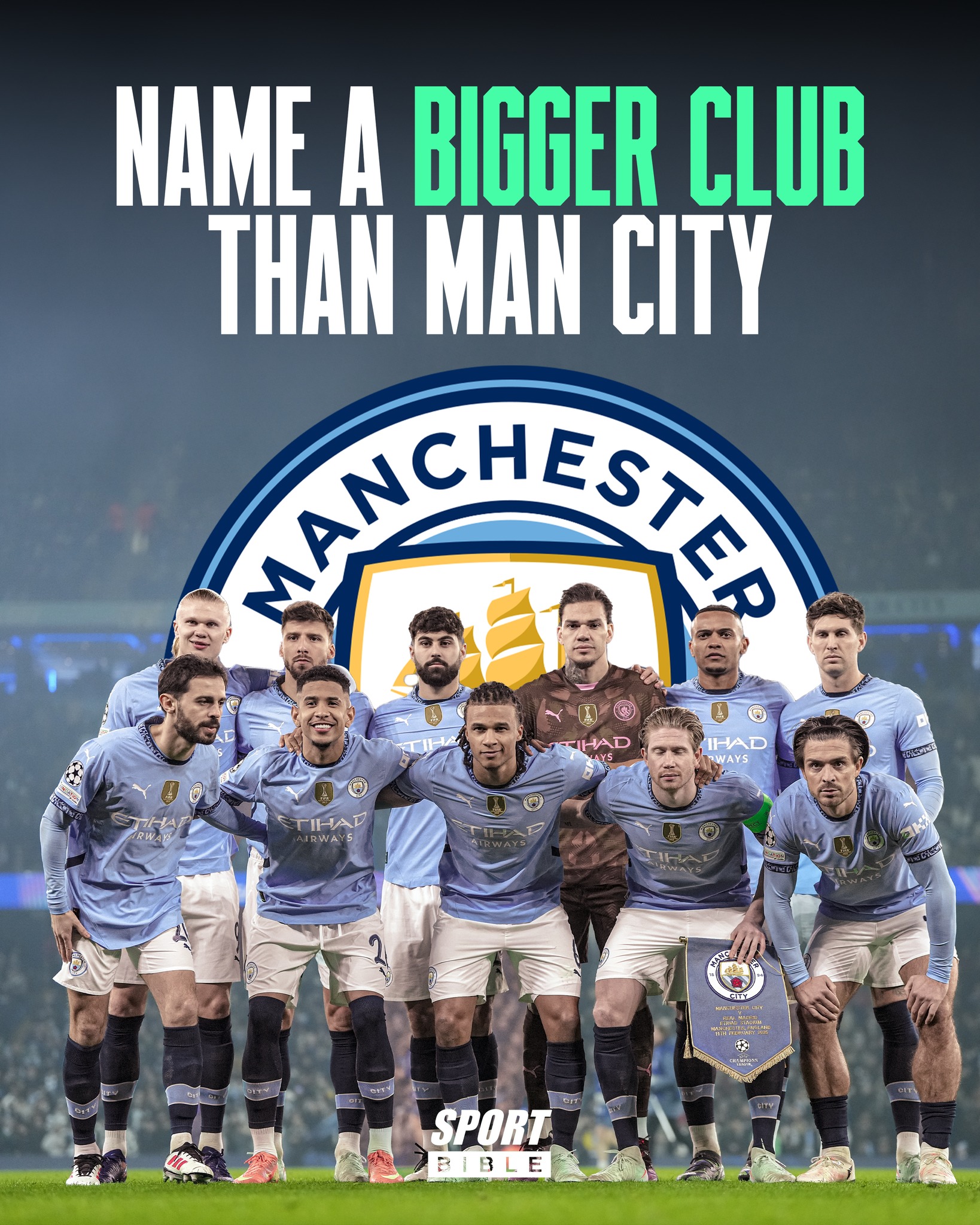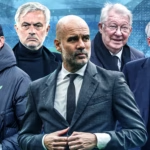Teams like Manchester United and Tottenham don’t even make the top 20 despite their status as one of the Premier League’s ‘big six.’

In the beautiful game of football, determining which team stands above all others represents one of the sport’s most enduring debates. The question of supremacy transcends simple statistics, delving into the realm of subjective analysis where passion meets data, and tradition clashes with modern metrics. While trophy cabinets and recent victories provide compelling evidence, the dynamic nature of football ensures that any team can triumph over another on any given day, making definitive rankings a complex endeavor.
The challenge becomes even more intricate when comparing teams across different leagues, continents, and playing styles. How does one measure the strength of Manchester United against Cristiano Ronaldo’s Al-Nassr? Can European giants be fairly compared to South American powerhouses? These questions have long plagued football analysts and fans alike, leading to heated discussions in stadiums, pubs, and social media platforms worldwide.
Fortunately, advanced analytics have provided a more scientific approach to this age-old question. Opta, one of football’s most respected data analysis companies, has developed a comprehensive Power Rankings system that attempts to quantify team strength using sophisticated algorithms and extensive historical data. Their methodology represents a groundbreaking approach to understanding football excellence in the modern era.
The Science Behind the Rankings: Understanding Opta’s Methodology
Opta’s Power Rankings system employs an Elo algorithm, a mathematical formula originally developed for chess rankings but adapted for football’s unique characteristics. This sophisticated system analyzes results from over 2.5 million games, creating a vast database that spans decades of football history across multiple continents and competition levels.
The algorithm considers numerous factors when calculating team ratings. In-league performance forms the foundation, examining how teams perform against their domestic rivals over extended periods. However, the system goes beyond simple win-loss records, incorporating the overall strength of each division, providing context for achievements in stronger versus weaker leagues.
Country ratings add another layer of complexity, recognizing that success in the Premier League carries different weight than victories in lesser-known divisions. Continental ratings further refine these calculations, acknowledging the varying competitive standards across different regions of the world. This multi-layered approach ensures that teams are evaluated not just on their results, but on the quality of opposition they face regularly.
The beauty of this system lies in its ability to provide comparable ratings across all levels of football. Whether a team plays in England’s Premier League, Spain’s La Liga, or any other division worldwide, they receive a rating that can be directly compared to teams from entirely different footballing ecosystems.
Ranks 30-21: The Foundation of Elite Football
Everton (30th – Rating: 91.1)
David Moyes’ return to Everton has provided the stability that eluded the Toffees under Sean Dyche. What began as a potential relegation battle transformed into a comfortable mid-table finish, with the Merseyside club securing 13th place and finishing over 20 points clear of the relegation zone. Moyes’ tactical acumen and understanding of the club’s culture proved invaluable in steadying the ship during turbulent times.
The experienced Scottish manager’s ability to maximize limited resources while implementing a pragmatic yet effective playing style demonstrates why he remains one of the Premier League’s most respected tacticians. Everton’s inclusion in the top 30 reflects their solid defensive organization and improved attacking threat under Moyes’ guidance.
Club Brugge (29th – Rating: 91.1)
Belgian football’s standard-bearers continue to punch above their weight in European competition. Club Brugge’s consistent performances in the Champions League and domestic dominance in the Belgian Pro League have earned them recognition among Europe’s emerging forces. Their youth development system and shrewd recruitment policy have created a sustainable model for competing against wealthier opponents.
Manchester United (28th – Rating: 91.3)
Perhaps the most shocking entry in these rankings, Manchester United’s fall from grace represents one of modern football’s most dramatic declines. Ruben Amorim’s appointment brought hope to Old Trafford, but even reaching the Europa League final couldn’t mask the underlying issues plaguing the club. Their defeat to Tottenham in that final epitomized a season of missed opportunities and underperformance.
The Red Devils’ rating reflects not just their poor domestic campaign but also their inability to translate individual talent into collective success. With a squad containing world-class players, their position highlights the importance of tactical cohesion and team chemistry in modern football.
PSV Eindhoven (27th – Rating: 91.3)
The Dutch giants demonstrated remarkable resilience in claiming their domestic title after a challenging start to the campaign. PSV’s turnaround exemplifies the importance of patience and tactical flexibility in modern football management. Their attractive attacking style, combined with improved defensive solidity, made them worthy champions of the Eredivisie.
AC Milan (26th – Rating: 91.5)
Once the undisputed kings of European football, AC Milan’s current position reflects how dramatically the football landscape has shifted. The Rossoneri’s mid-table Serie A finish represents a stark contrast to their illustrious past, when they regularly challenged for Champions League glory and dominated Italian football.
The club’s struggles highlight the challenges facing traditional powerhouses in adapting to modern football’s financial and tactical evolution. Despite possessing talented individuals, Milan’s inability to consistently perform at the highest level has relegated them to a rebuilding phase.
Juventus (25th – Rating: 91.7)
The Old Lady’s decline from Serie A dominance to barely securing Champions League qualification illustrates how quickly fortunes can change in elite football. Once the unquestioned rulers of Italian football, Juventus now finds itself fighting to remain relevant among Europe’s elite clubs.
Their disappointing Champions League campaign compounded domestic struggles, leaving supporters questioning the club’s direction and long-term strategy. The challenge of rebuilding while maintaining competitive standards has proven more difficult than anticipated.
Benfica (24th – Rating: 91.7)
Portuguese football’s sleeping giant continues to develop exceptional talent while competing at the highest European level. Benfica’s reputation for nurturing young players and selling them for substantial profits has created a sustainable business model that keeps them competitive despite regular roster turnover.
Sporting CP (23rd – Rating: 91.8)
Under various managers, Sporting has demonstrated the tactical flexibility and mental resilience required to compete for major honors. Their Portuguese league triumph showcased a well-organized team capable of performing under pressure when it matters most.
Nottingham Forest (22nd – Rating: 91.8)
Nuno Espirito Santo’s transformation of Nottingham Forest from relegation candidates to European contenders represents one of the Premier League’s most remarkable turnarounds. The Portuguese manager’s tactical expertise and motivational skills have unlocked potential that few observers recognized.
Forest’s rise demonstrates how proper coaching and team unity can overcome financial limitations. Their journey from the Championship to European qualification contention in such a short timeframe provides inspiration for clubs with similar ambitions.
Brentford (21st – Rating: 91.8)
Thomas Frank’s Brentford continues to defy expectations with their sophisticated approach to recruitment and tactical innovation. The Danish manager has created a system that maximizes player potential while maintaining Premier League competitiveness despite limited resources compared to traditional powers.
Ranks 20-11: Europe’s Established Powers
Bournemouth (20th – Rating: 92.1)
Andoni Iraola’s Bournemouth experienced a season of contrasts, beginning with European aspirations before encountering a mid-season dip that tempered expectations. The Spanish manager’s possession-based philosophy has gradually taken root, creating an attractive style that promises future success.
AS Roma (19th – Rating: 92.3)
The Italian capital’s representatives missed Champions League qualification despite possessing quality throughout their squad. Roma’s inconsistency highlighted the challenges of building sustainable success in Serie A’s increasingly competitive environment.
Atalanta (18th – Rating: 92.9)
Gian Piero Gasperini’s Atalanta continues to embody attacking football at its most exhilarating. Spearheaded by the dynamic Ademola Lookman, the Bergamo-based club shocked European football by ending Bayer Leverkusen’s unbeaten run in the Europa League final, demonstrating their ability to rise to the biggest occasions.
Their third-place Serie A finish confirmed Atalanta’s status among Italy’s elite, while their fearless approach to attacking football has won admirers across the continent. The club’s success story proves that innovative tactics and unwavering commitment can overcome financial disadvantages.
Bayer Leverkusen (17th – Rating: 92.9)
Xabi Alonso’s miraculous work at Bayer Leverkusen deserves recognition as one of modern football’s greatest coaching achievements. The Spanish tactician transformed a struggling team into Bundesliga champions while maintaining an unbeaten league record throughout the entire campaign.
Their longest European unbeaten run of all time, culminating in that dramatic 2-2 draw against Roma, showcased Leverkusen’s mental fortitude and tactical sophistication. Although they couldn’t complete a historic treble, their achievements under Alonso will be remembered for generations.
Napoli (16th – Rating: 93.1)
Antonio Conte’s return to Italian football sparked Napoli’s resurgence, with the addition of Scott McTominay proving particularly inspired. The Scottish midfielder’s all-action performances perfectly complemented Conte’s tactical system, helping the Partenopei overcome Champions League finalists Inter Milan to claim the Serie A title.
When performing at their peak, Napoli appeared unstoppable, combining defensive solidity with devastating counter-attacking ability. Their lack of European football may have impacted their overall ranking, but domestically, they proved themselves Italy’s finest team.
Borussia Dortmund (15th – Rating: 93.1)
The Black and Yellows secured Champions League qualification by the narrowest of margins, finishing just two points ahead of their closest rivals. Their earlier European exit disappointed supporters accustomed to the club’s continental adventures, highlighting the challenges of maintaining consistency across multiple competitions.
Atletico Madrid (14th – Rating: 93.5)
Diego Simeone’s warriors experienced a frustrating campaign, finishing third in La Liga while suffering elimination at the hands of arch-rivals Real Madrid in European competition. Despite possessing quality throughout their squad, Atletico struggled to recapture the magic that has defined their most successful periods under the Argentine tactician.
Brighton & Hove Albion (13th – Rating: 93.6)
Fabian Hurzeler’s appointment as the Premier League’s youngest permanent manager raised eyebrows, but the German tactician quickly silenced skeptics with impressive performances that nearly secured European qualification. Brighton’s late-season form demonstrated their potential to establish themselves as a consistent top-half Premier League club.
Crystal Palace (12th – Rating: 94.3)
Oliver Glasner’s Crystal Palace achieved something truly special by winning their first major trophy in club history. Their FA Cup triumph over Manchester City at Wembley provided supporters with memories that will last a lifetime, while also securing European football for the upcoming season.
The Eagles’ second-half league improvement under Glasner suggested that cup success wasn’t a fluke but rather evidence of genuine tactical progress and improved player confidence.
Newcastle United (11th – Rating: 95.4)
Eddie Howe’s Newcastle celebrated their first major trophy in seven decades with Carabao Cup success over Liverpool, thanks to goals from Dan Burn and Alexander Isak. This triumph represented more than just silverware; it symbolized the club’s return to relevance after years of mediocrity.
The Magpies’ combination of defensive solidity and attacking threat has established them as genuine contenders for European football, while their cup success provides a platform for future ambitions.
Ranks 10-1: The Global Elite
Aston Villa (10th – Rating: 95.4)
Unai Emery’s transformation of Aston Villa from top-half hopefuls to Champions League contenders represents one of modern football’s most impressive coaching achievements. The Spanish tactician’s tactical expertise and motivational abilities have elevated players beyond their perceived limitations, creating a cohesive unit capable of competing with Europe’s elite.
Villa’s rise demonstrates the importance of proper coaching and strategic planning in modern football success.
Chelsea (9th – Rating: 96.0)
Enzo Maresca’s challenging start at Stamford Bridge eventually yielded positive results, with the Blues qualifying for the Champions League while winning the Conference League. After years of instability and underperformance, Chelsea appears to have found the right formula for sustainable success under the Italian manager’s guidance.
Real Madrid (8th – Rating: 96.3)
The Spanish giants’ lower-than-expected ranking reflects their struggles to integrate superstars Jude Bellingham and Kylian Mbappe into a cohesive unit. Despite possessing arguably the world’s most talented squad, Real Madrid’s failure to win La Liga and their early Champions League exit highlighted the challenges of managing superstar egos and expectations.
Inter Milan (7th – Rating: 96.5)
Reaching consecutive Champions League finals represents a remarkable achievement for Inter Milan, even though both ended in defeat. Their most recent 5-0 humiliation against PSG in Munich stung particularly deeply, while losing the Serie A title to Napoli compounded their disappointment.
Nevertheless, Inter’s consistent excellence across multiple seasons has established them among Europe’s elite clubs, with their tactical sophistication and defensive organization serving as templates for success.
Bayern Munich (6th – Rating: 97.2)
Vincent Kompany’s appointment raised eyebrows initially, but the Belgian manager’s impact proved transformational. After ending their decade-long Bundesliga dominance the previous season, Bayern responded with characteristic determination to reclaim Germany’s top prize.
Harry Kane’s arrival added a new dimension to Bayern’s attack, while Kompany’s tactical adjustments restored the winning mentality that has defined the club for generations.
Barcelona (5th – Rating: 98.0)
Hansi Flick’s Barcelona represents a perfect blend of youth and experience, with Lamine Yamal emerging as a generational talent destined for global superstardom. The German manager’s tactical discipline has maximized the potential of players like Raphinha and Robert Lewandowski, creating an exciting team capable of entertaining while winning.
Despite severe financial constraints limiting their recruitment options, Barcelona’s La Liga triumph showcased the power of exceptional coaching and academy development.
Manchester City (4th – Rating: 98.6)
Pep Guardiola’s Manchester City experienced their first significant adversity under the Spanish genius, with a seven-game winless run providing early warnings that perfection isn’t sustainable indefinitely. Despite this temporary setback, City’s overall body of work under Guardiola maintains their status among the world’s elite clubs.
The Citizens’ tactical sophistication and depth of quality throughout their squad ensures they remain capable of competing at the highest level across all competitions.
Paris Saint-Germain (3rd – Rating: 98.3)
Luis Enrique’s PSG achieved the ultimate prize with their historic treble, finally capturing the Champions League trophy that had eluded them for so long. Despite losing Kylian Mbappe to Real Madrid, the Parisians demonstrated that collective strength can overcome individual losses.
Their Champions League triumph validated years of investment and ambition, establishing PSG as a legitimate global powerhouse rather than merely a wealthy project.
Arsenal (2nd – Rating: 99.5)
Mikel Arteta’s Arsenal came agonizingly close to Premier League glory for the second consecutive season, demonstrating remarkable consistency while falling just short of their ultimate objective. Despite their European exit at PSG’s hands, the Gunners’ tactical evolution under the Spanish manager has been impressive.
Arsenal’s combination of youth and experience, coupled with Arteta’s tactical sophistication, suggests they will remain title contenders for years to come.
Liverpool (1st – Rating: 100)
Arne Slot’s seamless transition from the seemingly irreplaceable Jurgen Klopp represents one of football management’s most impressive achievements. Many predicted a difficult adjustment period, but the Dutch tactician’s tactical acumen and man-management skills ensured continuity of success.
Liverpool’s Premier League triumph with four games remaining demonstrated their superiority over domestic rivals, while their consistent performances throughout the campaign justified their position atop these global rankings. Despite their Champions League disappointment, the Reds’ overall excellence across the season makes them deserving winners of this prestigious recognition.
Conclusion: The Ever-Evolving Nature of Football Excellence
These Opta Power Rankings provide fascinating insights into contemporary football’s hierarchy, revealing how traditional powerhouses must constantly evolve to maintain relevance while emerging forces challenge established orders. Liverpool’s ascension to the summit reflects not just their domestic dominance but also the seamless transition achieved under new management.
The rankings highlight football’s unpredictable nature, where financial resources don’t guarantee success, and proper coaching can elevate teams beyond their perceived limitations. As the beautiful game continues evolving, these rankings will undoubtedly shift, reflecting new triumphs, unexpected failures, and the endless pursuit of footballing perfection that makes this sport so captivating for billions of fans worldwide















